This
is a page within the www.staffshomeguard.co.uk website.
To
see full contents, go to SITE
MAP.
|
MEMORIES
AND INFORMATION - WARWICKSHIRE
SUTTON
COLDFIELD HOME GUARD
6th WARWICKSHIRE (SUTTON) BATTN.
|
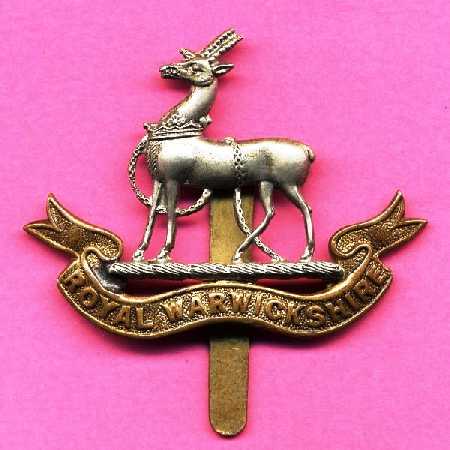 The area of Sutton Coldfield
was the responsibility of the 6th Warwickshire (Sutton)
Battalion.
In 1941 the Battalion was commanded by Lt.
Col. W. Bigwood, M.C.,
late of the Indian Army. There are several pages within this
website providing information about the Battalion, including
this one - see
this
summary to find them. The area of Sutton Coldfield
was the responsibility of the 6th Warwickshire (Sutton)
Battalion.
In 1941 the Battalion was commanded by Lt.
Col. W. Bigwood, M.C.,
late of the Indian Army. There are several pages within this
website providing information about the Battalion, including
this one - see
this
summary to find them.
Below is a
list of those men who have so far been identified as
members of the 6th Battalion - and also a few of the many
Suttonians who served in Birmingham and elsewhere in
factory units at their place of work. This list represents
only a small proportion of
the 1000/2000 men (and a few women) who will have served
in the Battalion between May 1940 and December 1944.
(If you can add a name,
please use the Feedback link at the foot of this page)
Allton, S.V., 2/Lt.
Ball, A.H.
Bate, Peter Geoffrey
Bigwood, W.
Lt.-Col.,
- Battn. C.O.
Bingham, G.W.
Brosch, John R.,
Capt. Butterfield, W.
A., 2/Lt.
Clarke,
Charles
Clark, J.W.,
2/Lt.
Darby, Norman Frank
Evans, John "Jack", Cpl.
Garner, W.
Gay, J.A., Col.*
Green, W. W.,
Lt.
Hammond
Hassell, James
Hollands, H.W.*
Holte-Smith, L., Lt-Cpl.*
Hood, Dennis
Hudspith, William
|
Irwin, J.,
2/Lt.
Iveson, J.
, Lt.
Kean, W.A.,
2/Lt.
Kemp, Jack
, Lt.
Killick
Knott, Wilfred G.
V.,
Sgt.
- (later A.A.)
Larard, J. H.,
Lt.
McCrea, A.M.*
Mitcheson, J.C., Lt.*
Mynett, Ed.,
2/Lt.
-
formerly
Cpl.
Norton, F.
Norton, Fred
Padley, Maurice
E.,
Pte.
Pearce, H. E.,
Lt.
Proffitt, Horace
Purden, I.
M., 2/Lt.
Reed, Josiah Percy,
Lt.
Riggall, David
Rudge
|
Sampson, F.H. Lt.*
Shorthouse, Harry
Slater
Smith, John
Strevens, H.,
Lt.-Col.*
Thomas, Douglas,
Cpl.
Thomas, Rupert L.
Lt.
Thornton, William,
Turner, E.
-
see Ball
information
Webb, "Mac"
Westrup, Eric,
Pte.
Wightman/Whiteman
Williams, G.L.*
Wilson, Laurence E., Pte. **
Windsor, C.,
2/Lt.
Witt, E.C.*
Young, D.G.,
2/Lt.
* denotes men who
appeared in a newspaper caption and were described
as Battalion members but whose membership of the
6th Battalion has not otherwise been confirmed.
** denotes unconfirmed. This member may have been
a member of the Kynoch Home Guard. |
The links in the
above list lead to further information about individual
men, either on this page or within dedicated pages within
this website.
****************
The information below relates to several
men who appear on the above list.
A. H. Ball and his friend E. Turner
both served in the Home Guard at
Walmley Ash Road.
The huts later became home to those who needed one -
perhaps people who had been bombed out or perhaps, later,
to displaced persons/refugees from abroad ("d.p.") or to
"squatters", those who could not find homes in the postwar
housing shortage and took over such accommodation
unofficially.Mr. Ball lived in
Fowler
Road and worked at the Gas Works. Mr Turner was employed
at
Dunlop.
| Lt.-Col. H.
BIGWOOD, M.C. |
Colonel Bigwood, late of the Indian
Army, was C.O. of the 6th Battalion in the 1941 Officers'
List and probably served in that role throughout. He
lived on the corner of
Four Oaks Road and Streetly Lane, adjacent to
Burcot
Grange School.
Charles Clark was the publican of
the White Lion on
Hill Village Road. (Was this the
local Platoon H.Q?) He and his comrades had to share
the bowling green pavilion with the Women's Institute -
run by his wife.
Cpl. Norman Frank
Darby lived in Sutton Coldfield but was employed at
Cincinnati Ltd.
of Kingsbury Road, Erdington where he
joined the factory Home Guard unit. This unit was of
Company strength and was part of one of the adjoining
Birmingham Home Guard battalions. A 1942 photograph
of all or most of its members survives and Noman is ringed
in blue:

Norman was not
destined to see the war out either at Cincinnati
or serving in the Home Guard. At some time after the above
photograph he enlisted in the Royal Navy and went on to qualify
as a Fleet Air Arm pilot after aircrew training (which,
according to the image below, might well have occurred
Canada).
Images
© Steve Darby 2018
John (Jack)
Evans was manager of Dewhurst's, a butcher's shop on
The Parade.
He
volunteered for the Home Guard and served
throughout the Battalion's existence. He just missed the Great War as he was conscripted,
completed his basic training and was then just about to be
deployed to France when the Armistice was called. Instead,
he went to India and served for at least three years.
(Webmaster note: Was John Evans the
landlord of
David Riggall whose memoir appears elsewhere
on this website?)
James Hassell was a member of the
Sutton Battalion. He had served in the
Staffordshires during the Great War and had survived the
Somme. His Home Guard duties in WW2 included guarding the
railway bridge which, most conveniently, was located
adjacent to the King's Arms
pub.
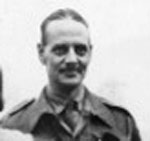 Lt.
John Herbert (Jack) Kemp Lt.
John Herbert (Jack) Kemp
(1903-1972)
was also an officer in the 6th Warwicks. He was almost
certainly promoted in the course of the Battalion's
existence, probably in 1942/43, unlike most of his brother
officers who
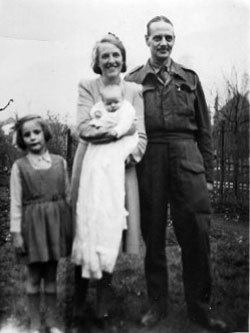 would
have seen Great War experience and had quickly been given
positions of authority in May/June 1940. As men with
special personal qualities of leadership, ability and
specialist skills were identified, they were promoted to
appropriate positions and Jack Kemp
obviously fell into that category. would
have seen Great War experience and had quickly been given
positions of authority in May/June 1940. As men with
special personal qualities of leadership, ability and
specialist skills were identified, they were promoted to
appropriate positions and Jack Kemp
obviously fell into that category.
Jack Kemp was an engineer by
profession and inclination, working for a Sutton company
and also pursuing similar interests in his spare time. He
lived with his wife and two young daughters at
11 Oakwood Road, Boldmere
and is seen (right)
with them in 1944.
An interesting group image
survives in his papers:
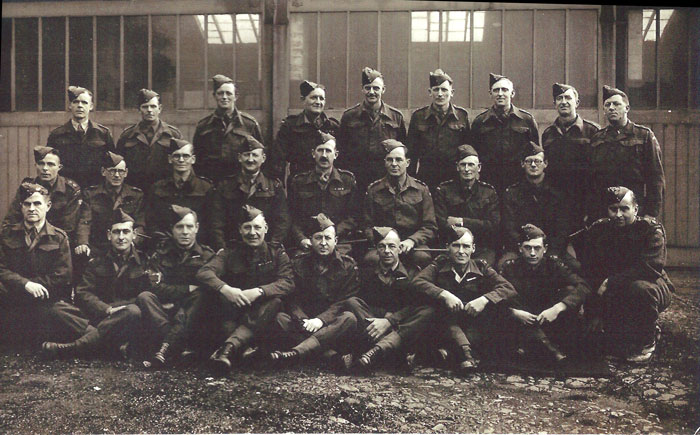
Jack Kemp is in the centre of
the back row, 5th from each end and all the men are Home
Guard officers.
We cannot be 100% sure of the
interpretation of this image. The assumption has to be
that it shows him with twenty-five of his fellow 6th
Battalion officers. Slight doubt creeps in, however: none
of the faces is recognisable as belonging to men known to
have been Battalion members; and twenty-six is a strange
number for a group of this type - too large for an
individual Company within the Battalion and too few for
the Battalion as a whole. The other possibility is a group
of men from various units, including Jack, on some
training course or other - even perhaps one for newly
commissioned officers. We hope to clarify this in due
course.
Images © Joy Frey 2018
Ed
Mynett's service in the 6th Battalion is recorded
in three surviving photographs.
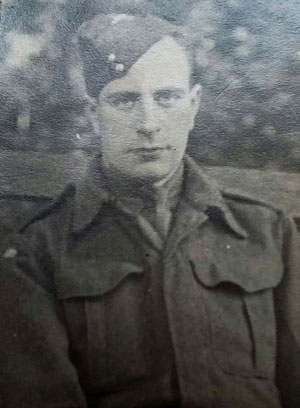 In one of these (right) -
chronologically speaking, likely to be the last of those
in which he appears and dating from later in the war - he
appears as an officer, most probably a 2/Lt. although no
insignia is visible. He has been promoted. In the earlier
part of the Home Guard's life, almost all senior positions
were held by those with previous military experience which
normally meant Great War service. But later on, men with
appropriate leadership skills and other valuable abilities
were appointed to NCO and officer rank. Ed Mynett,
too young to have fought in that conflict, was clearly one
of those capable men. In one of these (right) -
chronologically speaking, likely to be the last of those
in which he appears and dating from later in the war - he
appears as an officer, most probably a 2/Lt. although no
insignia is visible. He has been promoted. In the earlier
part of the Home Guard's life, almost all senior positions
were held by those with previous military experience which
normally meant Great War service. But later on, men with
appropriate leadership skills and other valuable abilities
were appointed to NCO and officer rank. Ed Mynett,
too young to have fought in that conflict, was clearly one
of those capable men.
In the other two images, Ed is a
corporal. It is earlier in the war and he has yet to be
promoted. In the first he is standing at the left
hand end of the second row with a group of his comrades.
The venue is the front of the
Empress Cinema in The
Parade - an apparently popular venue for such
photographs.
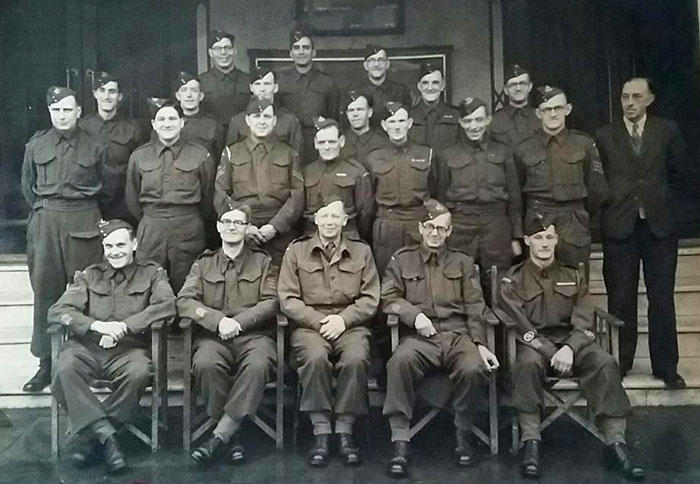
And finally he appears in one
of those rare and welcome group images where the men are
barely aware of the camera and which give us a tiny
insight into life in the Home Guard. Ed is second
from the right. The others comprise four sergeants and an
officer. The sergeants and the officer are almost
certainly survivors of the Great War. If they were to turn
around we should probably see their ribbons. What is the occasion? Perhaps the end
of a summer display for the public, or a break in
proceedings. Presumably in Sutton Park. It's time for a
fag and a chat. The officer is holding forth. It
looks as though things have gone off well. The other men
are listening, attentively, politely. One of them draws on
his cigarette. Hands are
clasped behind backs or arms are folded.
There is a feeling of deference and respect. And who
is the boy who has inserted himself into the group?
No doubt the son of one of the men - perhaps the sergeant
who is partly obscured - and in his Sunday best.
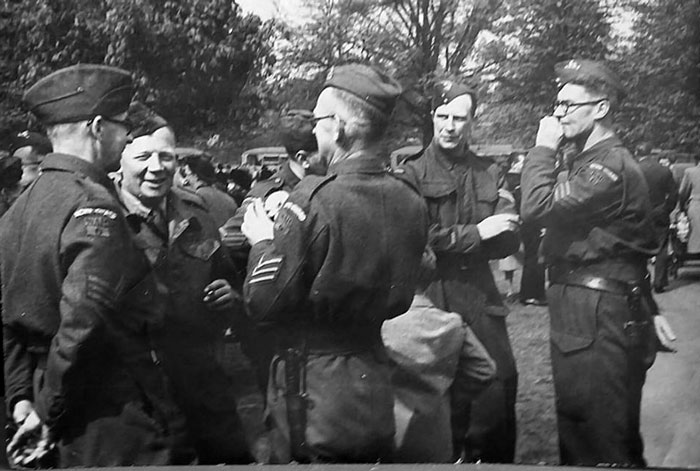
Ed Mynett's civilian occupation was
with Metro Cammell at
Elmdon on aircraft production.
|
Images
© Rosalind Mynett 2018 |
|
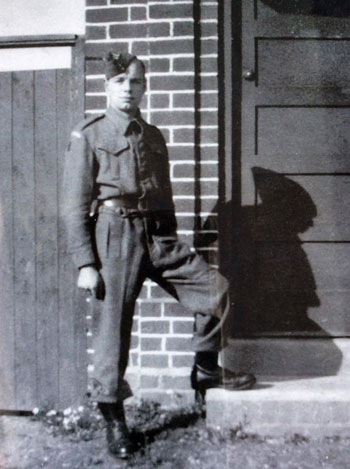 Pte.
Maurice E. Padley
(right) volunteered in February 1941 and served
through to the end in December 1944. For the first
two years his role would have been that of the traditional
infantryman in Four Oaks but in late 1942 or early 1943 he transferred,
with an unknown degree of enthusiasm or reluctance, to
a
local anti-aircraft battery. Pte.
Maurice E. Padley
(right) volunteered in February 1941 and served
through to the end in December 1944. For the first
two years his role would have been that of the traditional
infantryman in Four Oaks but in late 1942 or early 1943 he transferred,
with an unknown degree of enthusiasm or reluctance, to
a
local anti-aircraft battery.
Maurice's local Home Guard H.Q. was located
at the Old Crown pub, at
the Crown Lane/Walsall Road
crossroads in Four Oaks. His day job was at the Spitfire
factory in Castle Bromwich
where he undertook night-time fire-watching duties up on
the roof - all over and above his normal responsibilities
of a long working week and evening/weekend H.G. duties. His service was acknowledged by
King George VI.
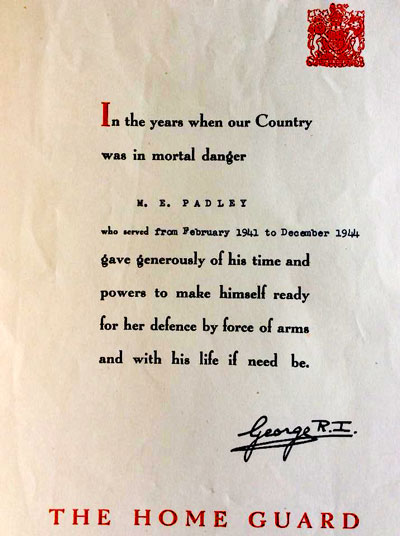
Images
© The Padley Family 2018
We were very pleased to
receive from Mr. G.W.A. Pearce, late of Sutton
Coldfield, a fascinating memory of another member of this
Battalion, his late father, Lt. Harold E.
Pearce. We reproduce it below with the author's
permission.
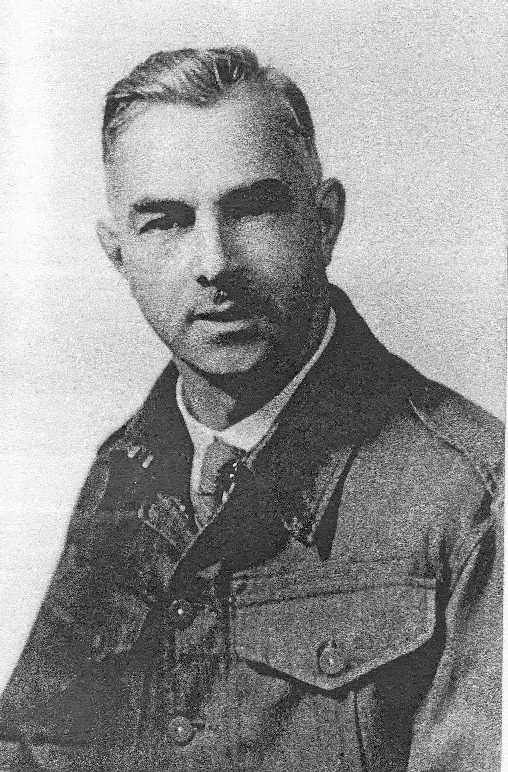 My
father, Harold E. Pearce, born on 18th June 1893, won a
scholarship to Bishop Vesey's Grammar School and was there
from about 1903 until 1909. Thereafter he had served in
WW I but being too old for Army service in WWII had volunteered
at once when the Local Defence Volunteers, LDV, was formed,
which was soon renamed the Home Guard. My
father, Harold E. Pearce, born on 18th June 1893, won a
scholarship to Bishop Vesey's Grammar School and was there
from about 1903 until 1909. Thereafter he had served in
WW I but being too old for Army service in WWII had volunteered
at once when the Local Defence Volunteers, LDV, was formed,
which was soon renamed the Home Guard.
He is pictured right
in 1940 in the denim uniform which started to be issued
to Home Guards at the end of May, long before full battledress
became available towards the end of the year.
We lived at
40 Beacon
Road, Boldmere at that time and almost at once he was appointed
as Musketry Officer for the local Battalion, as a Lieutenant.
He was a self-employed accountant and auditor by day and
did his Home Guard parades or duties on many evenings, including
weapon training sessions, and guard duties at the
Light
Alloy Co Ltd., a company making aluminium parts for aircraft,
at, I think, Minworth, near Walmley. He also attended a
short course on the Blacker Bombard or Spigot Mortar, a
device for projecting a rugger ball sized bomb with a long
hollow tube tail, from a heavy metal spigot, about 2 inches
diameter and 3 feet long.
I remember him bringing
home a Browning automatic rifle, to find out how to strip
and reassemble it, before instructing the Battalion on it.
I have a vague idea that the Battalion HQ was in
Hartopp
Road, Sutton.
A good friend of his
in the Home Guard was Jim Iveson......
© G.W.A. Pearce 2007
Horace (Pat/Harry) Proffitt served
in the Home Guard, probably the 6th Warwickshire. He
lived in Tower Road, Four Oaks.
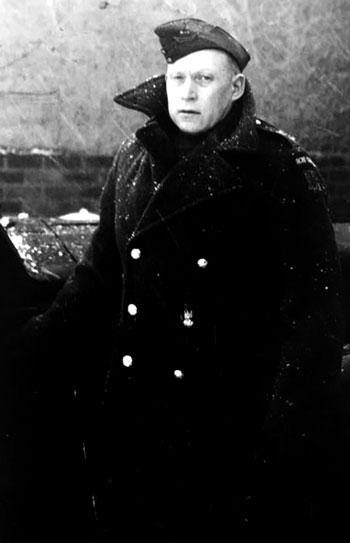 Lt.
Josiah Percy Reed was a Suttonian living in
Walmley who
was a member of a factory Home Guard unit at his place of
work rather than the local 6th Warwickshire Battalion. He
was C.O. of a Platoon within the
Bromford Tube works
Company. His name appears in the February 1941 Officers'
List as a 2/Lt. and from this we can assume that he held a
position of authority from the very beginning which, in
turn, indicates Great War service. The wintry image of him
(right) reminds us that Home Guard duty was not always
carried out on the warm, summer days which are the
backdrop to so many HG photographs - in fact, rarely so. Lt.
Josiah Percy Reed was a Suttonian living in
Walmley who
was a member of a factory Home Guard unit at his place of
work rather than the local 6th Warwickshire Battalion. He
was C.O. of a Platoon within the
Bromford Tube works
Company. His name appears in the February 1941 Officers'
List as a 2/Lt. and from this we can assume that he held a
position of authority from the very beginning which, in
turn, indicates Great War service. The wintry image of him
(right) reminds us that Home Guard duty was not always
carried out on the warm, summer days which are the
backdrop to so many HG photographs - in fact, rarely so.
Josiah Reed's day job was that of metallurgical
chemist. This position involved him in secret government
work on metal fatigue and led to his making several
transatlantic crossings in the course of the War.
Image
© Clare Lee 2018
John Smith lived in Mere Green, volunteered for the
Home Guard in 1941 at the age of seventeen and served for
around 18 months before call-up which took him to India,
Burma and Malaya.
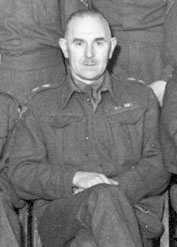 A
further officer was Lt. Rupert
L. Thomas. He lived during the war
years, and later, at 37 Walsall Road, Four Oaks
with his wife and daughter, Nora
(later the wife of
Pte. Graham Myers,
32nd Staffs H.G. and Royal Artillery). A
further officer was Lt. Rupert
L. Thomas. He lived during the war
years, and later, at 37 Walsall Road, Four Oaks
with his wife and daughter, Nora
(later the wife of
Pte. Graham Myers,
32nd Staffs H.G. and Royal Artillery).
Like
so many of his Home Guard comrades, this officer, sometime
Captain in a Welsh regiment, was a survivor of the Western
Front. He joined the LDV in the earliest days and became
a platoon commander, responsible for the area around Wishaw.
In addition to his skills and experience he brought with
him his service revolver and just two rounds of ammunition,
to supplement the Battalion's inadequate armoury. For the
rest of his Home Guard service Rupert Thomas was known by
his comrades as "Two-Shots Thomas". The Company
HQ of his unit was within a disused pub on the corner of
Tamworth Road and Whitehouse Common
Road.
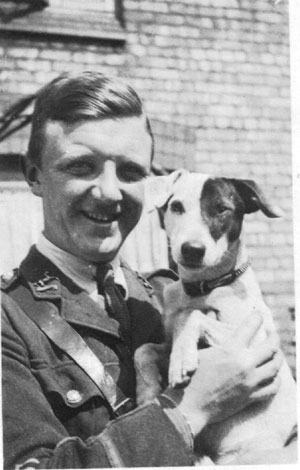 Eric Westrup, originally from
New Brighton, had served
as a second-lieutenant in the
King's Liverpool Regiment in France during
the Great War. Prior to joining up he had served in the
Territorial Force. He lived in
Knighton Close, Four Oaks and served during the
1930s in the Territorial Army. Some time after the outbreak
of war in 1939 and his transfer into the Regular Army he was
discharged on medical grounds. Thereupon he volunteered
for the Home Guard and served happily in the 6th
Warwickshire as a private for the rest of the war. Eric Westrup, originally from
New Brighton, had served
as a second-lieutenant in the
King's Liverpool Regiment in France during
the Great War. Prior to joining up he had served in the
Territorial Force. He lived in
Knighton Close, Four Oaks and served during the
1930s in the Territorial Army. Some time after the outbreak
of war in 1939 and his transfer into the Regular Army he was
discharged on medical grounds. Thereupon he volunteered
for the Home Guard and served happily in the 6th
Warwickshire as a private for the rest of the war.
Eric was photographed in the summer of 1918 at
New
Brighton (right). He later became the brother-in-law of E. Trevor Evans,
an RFC/RAF pilot whose story appears elsewhere within this
website.
(Please note: Laurence Wilson's
membership of the 6th Battalion has not been confirmed.
Whilst his home was in Sutton, his place of work was in
Birmingham and so it is possible that he was a member of
the ICI Metals/Kynoch Works Home Guard unit, part of the
46th Warwickshire (Birmingham)
Battalion).

Laurence Edwin Wilson
(1923-2002),
better known as Laurie, was a member of the local Home
Guard. Little is known of his H.G. service, apart from a
family memory of it and an image of him, in uniform, taken
in Sutton Park in 1943. Laurie was living at the time in
Wrekin Road, Boldmere,
had been educated at King Edward's,
Edgbaston and was a
trainee draughtsman at ICI Metals Division (later IMI) at
Witton.
Laurie married his wife Vera
Higgins in 1946 and remained at ICI/IMI for the remainder
of his working life.
Image
©
Helen Price 2025
***********
In Memory of
ALL MEMBERS
of
THE SUTTON HOME GUARD
and of
THOSE SUTTON MEN
who served in nearby Battalions
6th Warwickshire
(Sutton) Battalion
Home Guard
1940-1944
|
ACKNOWLEDGEMENT
Grateful acknowledgement is made
to
- Mr. G.W.A. Pearce (for the above information
about his father, Harold Pearce);
- Mrs Joy Frey (Kemp);
- the late
Nora Myers (Thomas);
- the Palmer/Price families
(Westrup);
- Helen Price (Wilson).
- members of the Sutton History
Facebook group: Peggy Kennedy (Ball), Matthew
Clarke (Clarke),
Steve Darby (Darby), Antony Evans (Evans),
John Hassell (Hassell), Rosalind Mynett (Mynett). the late Keith Padley (Padley),
Brenda Davies (Proffitt), Clare Lee (Reed), Deborah Jaggers
(Shorthouse), Carolyn Mapp (Smith).
Images and text copyright:
© as stated above with reference to specific images;
otherwise © staffshomeguard.co.uk 2018
See
a
summary of all references to Sutton Home Guard within
this website
|
|
xx22 Updated August 2018,
December 2018, April 2020, October 2025 |
|
|